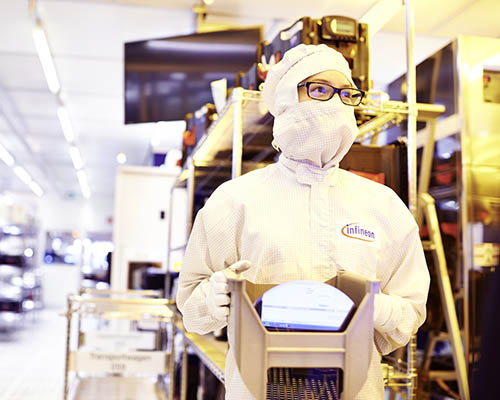The legal entity and its main tasks
Infineon Technologies AG (IFAG), Neubiberg (Germany), combines entrepreneurial success with responsible action to make life easier, safer and greener. Barely visible, semiconductors have become an indispensable part of everyday life. Ranked one of the global top 10 semiconductor companies, it plays a key role in shaping a better future – with microelectronics that link the real and the digital world. IFAG’s semiconductors enable efficient energy management, smart mobility, as well as secure, seamless communications in an increasingly connected world.
IFAG designs, develops, manufactures and markets a broad range of semiconductors and system solutions. The focus of its activities is on automotive and industrial electronics, communication and information technologies, IoT, sensor technology and security. The product range comprises standard components, software, customer-specific solutions for devices and systems, as well as specific components for digital, analogue, and mixed-signal applications. IFAG organizes its operations into four segments: Automotive, Industrial Power Control, Power & Sensor Systems and Connected Secure Systems.With 54 research and development locations and 20 manufacturing sites the company is active worldwide with approx. 46,700 employees. In the 2020 fiscal year the total revenue amounted to €8,567 million.
Tasks and justification in INSTABAT
IFAG will contribute to the project primarily by developing semiconductors and MEMS for battery applications, with an emphasis on direct & indirect sensors. A summary of the activities in which IFAG is going to participate is given below:
- WP1: IFAG will lead the specifications and requirements work package.
- WP2: IFAG intends to develop, improve, manufacture and test smart micro-sensors to measure the CO2 concentration inside of Li-ion battery cells. In addition, IFAG plans to improve, manufacture and test reference electrodes for the determination of working electrode potential during battery operation.
- WP5: IFAG will support the partners to enable the processing of data from all sensors considered within the project, for usage in battery modelling, battery virtual sensing, and the battery management system (BMS).
- Other minor contributions: Besides the specific contributions mentioned above, IFAG will contribute its fair share to the tasks of exploitation, dissemination and general project management.
CV of the persons
Dr. Thomas Roessler
Infineon, 85579 Neubiberg, Germany
Talal Khan Ali Zai
Infineon, 85579 Neubiberg, Germany
LIST of relevant publications
- Hong, H., Sevillano, J., Kain, C., Hofer, G., Felber, K., Chan, W. K., “Alternatives in Battery Communication Protocols”, SAE Technical Paper 2017-01-1212, doi:10.4271/2017-01-1212.
- Kolb S., Ruhl G., Rose M., Eberl M., Jost F., “Multisensor-System für Batterieanwendungen”, Prior Art Journal, Nr. 20, 2017
- Maurer, W., “Multifunctional intelligent Battery Cell”, Kraftwerk Batterie, Aachen, 2017.
- Schmitt, J. Kraft, B. Schmidt, J.P. Elian, K. Keser, G. Behne, S. Meir, B. Ensling D., Jossen, A., “In-situ measurement of gas pressure inside prismatic lithium-ion cells during operation and abuse scenarios”, Batterieforum Deutschland, 2019
- Theuss H., Kolb S., Eberl M., Schaller R., Chapter 3: “Photoacoustic Gas Sensor” in “Sensor Systems Simulations: From Concept to Solution”, Springer Nature Switzerland AG, 2019
List of relevant previous projects
- 3Ccar “Integrated Components for Complexity Control in affordable electrified cars” First feasibility study on PLC including basic channel characteristics, and first experiments w/ pressure and current sensors. (ECSEL 662192; FP7-2013-ICT-GC). Consortium partners involved: BMW, CEA
- DriveBattery2015 “Intelligent Concepts of Management & Circuity for Modular Battery Systems of Electric Vehicles to Increase Efficiency & Safety and Decrease System Cost”. Optimized BMS for modularity, BMS modelling, energy management, battery mains switch. (BMWi - German Ministry of Economics & Technology). Consortium partners involved: N/A
- MiBZ “Multifunctional intelligent Battery Cell”. Battery cell development w/ integrated sensors for temperature, pressure, gas and current. (BMBF within Battery 2020). Consortium partners involved: BMW, Varta
- LImeS “Lithium-ion cells for integration with extended sensorisation” General sensor development; improvement of communication between cell and BMS. Consortium partners involved: BMW, Varta
- COBRA “Cobalt Free Batteries for Future Automotive Applications”. Development of smart sensors, in particular development and modelling of “electrical impedance spectroscopy” (EIS) Consortium partners involved: CEA
Description of any significant infrastructure
IFAG develops, manufactures and markets innovative semiconductor products and complete system-on-chip solutions. IFAG has experience in technology development, in semiconductor processing, and manufacturing, and in intellectual property generation. All technical equipment relevant to the proposed work is available, as well as all the corresponding manufacturing logistics and manufacturing IT infrastructure. Furthermore, the know-how on running large heterogeneous manufacturing assignments is well established across all production facilities of IFAG.









